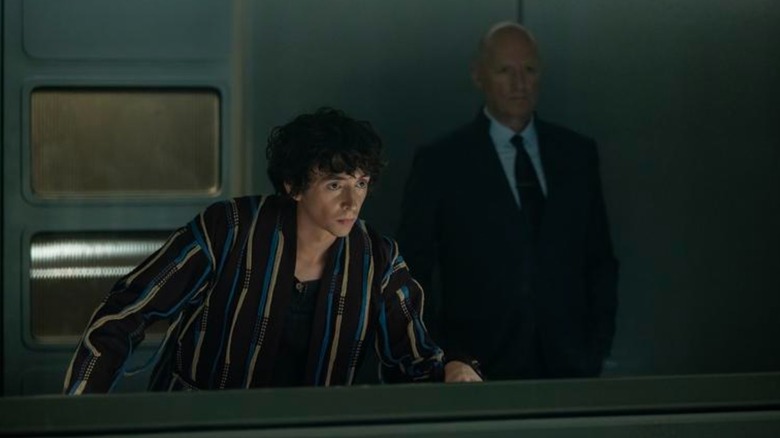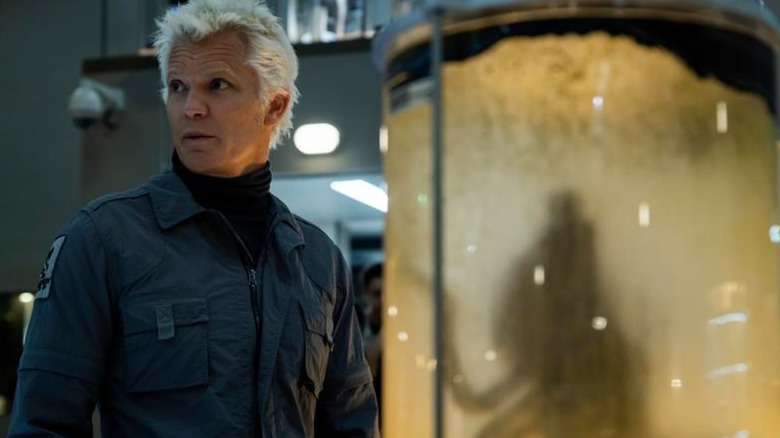Alien: Earth's New Siam Explained
This post contains spoilers for the two-episode premiere of "Alien: Earth."
The latest edition to the "Alien" universe is not short on jargon. The series, an earth-bound prequel appropriately titled "Alien: Earth," begins with a substantial on-screen glossary featuring a rundown of the three types of future humanoids found in this world: "synths," "cyborgs," and "hybrids." The on-screen titles don't stop there; throughout the first episode, they introduce the Weyland-Yutani Corporation's USCSS Maginot, a series of dates and mission-relevant measurements, and a new setting for franchise fans, megacorp Prodigy's research island – dubbed "Neverland" by its trillionaire creator.
Finally, viewers are introduced to New Siam, a place that we're told is also called Prodigy City. The city immediately looks familiar, and despite some automation, it still has a distinctly human touch that's missing from other areas of "Alien: Earth." We see colorful, busy streets and a system of floating transportation that's downright retro when contrasted against Prodigy's advanced surveillance and AI tech. The pre-technocratic name for the area is never uttered in these episodes, but context clues indicate that New Siam can only be one place: Bangkok, Thailand.
Corporate ruler Prodigy took over Thailand in Alien: Earth
Even if you've never seen the unmistakable cityscape of Bangkok for yourself, the origins of New Siam are obvious thanks to its name. Thailand was historically called Siam, especially by outsiders, and History Today notes that the name, originally Sanskrit, likely gained popularity when used by 16th century Portuguese colonizers. In Noah Hawley's dystopian vision of the future, the region is also colonized, but this time it's controlled by one corporation – Prodigy. In an interesting inversion of Ridley Scott's "Blade Runner," which imagined a future Las Vegas heavily influenced by Tokyo, Hawley conceives of a world where a bright, popular Asian city has been consumed by American greed.
Though the city's specific governmental structure hasn't fully been explained yet, a nifty bit of exposition in the pilot lays out the groundwork for a version of the world governed directly by companies. Prodigy, run by annoying, wealthy weirdo Boy Kavalier (Samuel Blenkin), has possession of the city formerly known as Bangkok. Despite this, the city's spirit shines through in early scenes that show off its bustling, distinctly human appeal. As Salon's Hanh Nguyen wrote after a set visit, "Removing space from the 'Alien' equation meant that Hawley had to envision what Earth 2120 looked like, and apparently, part of it looked like Thailand."
22nd century earth is a capitalist hellscape
Prodigy's newfound hold over the city is made apparent when we're introduced to the privatized military group that medic Hermit (Alex Lawther) is unable to leave. There's also a reference to a holiday called "Founder's Day," and while we don't see many festivities, Kavalier is told that the USCSS Maginot – a spaceship owned by corporate rival Yutani – smashed into a Kavalier-owned building while most of its tenants were at the Founder's Day Festival. To recap, one white guy who looks like he's twelve owns one of the biggest port cities in the world, an entire military, a bunch of high-rises, a private island built for Dr. Moreau-style experiments, and Timothy Olyphant's bleached eyebrows.
In classic 1% fashion, Kavalier's boundless riches don't exactly translate to prosperity or access for the people of New Siam. He clearly doesn't care at all about potential casualties from the spaceship crash, and wants a peek at Yutani's specimens even if a search and rescue team or any number of civilians have to die along the way. In a separate flashback, Hermit and others are also forced to come face to face with dusty, unfriendly paperwork processing machines at a nightmarish looking DMV-style office, one that seems designed to leave all who enter feeling powerless. Under Kavalier's thumb, Thailand is a far cry from the idyllic nation portrayed earlier this year in "The White Lotus."
With just two hours of storytelling under its belt, it's already clear that "Alien: Earth" possesses something even scarier than a Xenomorph: a bleakly accurate vision of what capitalism might look like in a hundred years.
New episodes of "Alien: Earth" premiere Tuesdays at 8 PM ET on FX and Hulu.


